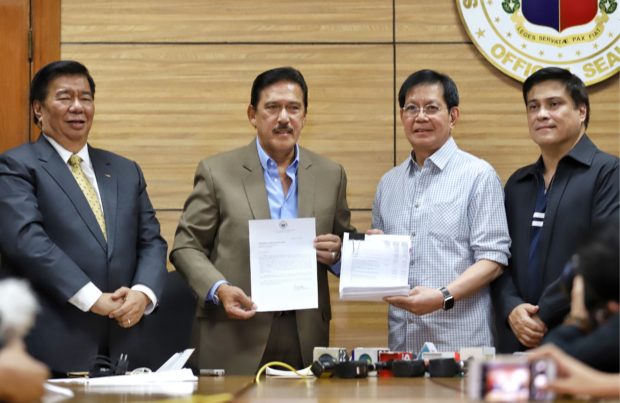
IT’S NOW UP TO THE PRESIDENT Senate President Vicente Sotto III, shown herewith Senators Franklin Drilon, Panfilo Lacson and Juan Miguel Zubiri, says on Tuesday he signed the budget bill “to no longer belabor the so-called 98 percent of the budget,” as the questioned portion was only about 2 percent of the measure. —SENATE PHOTO
Senate President Vicente Sotto III on Tuesday signed the P3.8-trillion budget bill for 2019 and sent it to Malacañang with a letter to President Rodrigo Duterte advising him to veto P75 billion in postratification changes made by the House of Representatives.
Sotto’s move ended a month-and-a-half-long stalemate between the Senate and the House over pork and brought the government closer to getting fresh funds after running on a reenacted 2018 budget since January.
In the annotation to the enrolled bill addressed to the President, Sotto said he signed the measure with “strong reservations” because of the “unconstitutional” changes made by the House after the congressional ratification of the bicameral report.
“My attestation is limited only to those items approved by the bicameral conference committee and ratified by both Houses of Congress,” he said in his letter.
“In particular, it is my view that it is unconstitutional that P75 billion worth of programs/projects under the local infrastructure program of the Department of Public Works and Highways was funded through internal realignments, after the bicameral conference committee report was ratified,” he added.
The House realigned cuts from the Asset Preservation Program, Network Development Program, Bridge Program, Flood Management Program, and Convergence and Support Program, he said.
He urged the President to veto the realignments.
“The President may wish to consider disapproving these unconstitutional realignments, pursuant to his constitutional power to veto particular items in the General Appropriations Bill,” he said.
The President has said he will not sign the budget if it proves to be illegal.
Presidential evaluation
Presidential spokesperson Salvador Panelo said on Tuesday that the President would “evaluate whether or not the opinion of the Senate is indeed correct.”
Panelo said the President would review the enrolled budget bill and sign it “if it is consistent with the Constitution.”
He issued a statement welcoming the submission of the budget bill and commending the Senate and the House for ending the standoff.
The postratification realignments made by the House had been the bone of contention between the two chambers and held up the approval of the spending measure for weeks.
Sotto had said he did not want to sign an unconstitutional document, while the House insisted that it only itemized lump-sum amounts in the measure.
Drilon’s solution
But his latest move broke the impasse, and he believed his letter to the President shielded him from any legal liability that might arise.
He said the decision to sign the bill with reservations was the suggestion of Minority Leader Franklin Drilon, a former justice secretary.
Sotto said he signed the bill “to no longer belabor the so-called 98 percent of the budget,” as the questioned portion was only about 2 percent of the measure.
“It’s up to the President, it’s up to the executive department,” he added.
Drilon said he suggested the “compromise solution” so that crucial government projects and programs could continue and the economy need not slow down.
His proposal, as contained in Sotto’s letter, allows the Senate to maintain its position that the postratification realignments are unconstitutional, while not prejudicing national interest by holding on to the budget bill, he explained.
Sen. Panfilo Lacson said this was not exactly passing the problem to the President, because it is the Chief Executive anyway who would decide whether to veto items in the budget or to conditionally implement projects.
Lacson said he had informed the House and Malacañang about the Senate’s decision on the budget before Sotto signed the bill with reservations.
Sotto said he did not sign the budget bill because he was pressured.
The Senate had been ready to play hardball because it knew it was on the side of the Constitution, he said, but it found a solution that would allow the budget to proceed without the chamber backing down. —With a report from Christine O. Avendaño